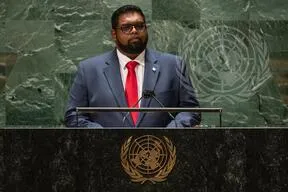Statement
Statement summary
MOHAMED IRFAAN ALI, President of Guyana, said that the COVID-19 “pandemic had exposed the shortcomings of our international system” and that nationalism still prevailed. The past two years have taught the world that nations are interconnected, and he regretted that the pandemic had “wrecked the 2030 Agenda for Sustainable Development” by reversing developmental gains and expanding poverty.
Underlining that economic recovery is essential to bringing developing countries back on track towards attaining the Sustainable Development Goals, he requested the international community to allocate more resources to these States through debt rescheduling, debt service moratorium and the provision of soft resources. Failing to do so will not only impact poor and vulnerable nations but also developed ones. The pandemic underscored the need for global collaboration, he said, thanking United States President Joseph R. Biden for hosting a COVID-19 summit which resulted in commitments for joint global action and additional resources. He also welcomed the recent meeting between representatives from the International Monetary Fund (IMF), the World Bank, the World Health Organization (WHO) and vaccine manufacturing companies to improve access to COVID-19 vaccines in developing countries.
On climate change, he deplored that “the promises of COP15 had not been delivered” and that recent studies have drawn a grim picture for the future of humanity. The consequences of climate change will result in political instability and will likely fuel regional and international conflicts. He added that while Guyana was one of the lowest emitters of greenhouse gas emissions, it would be among the first countries to suffer from climate-change-related disasters. The burden of emission reduction was not shared equitably. Innovative ways to collaborate must be found to address the fight against climate change and COP26 in Glasgow would be the right place to do so. Guyana would expect binding commitments and contributions to the most vulnerable economies to build up resilience against climate events.
On Guyana’s territorial integrity, he drew attention to continued threats from Venezuela, which recently issued a statement claiming two thirds of his country’s territory. Guyana “cannot be used as an altar of sacrifice for the settlement of Venezuela’s internal political differences”, he said, noting that the territorial dispute was settled by the International Court of Justice in 1966.
Commenting on other international issues, he expressed his nation’s “solidarity with the Palestinian people and its desire for a dignified existence in their own homeland in accordance with a two-State solution” and called on the international community to support that cause. Turning to Cuba, he invited the United States to normalize relations with the island State for the benefit of the region. Concluding, he said that Guyana’s diverse population is representative of the world, and that the country has been pursuing peace and prosperity by respecting human rights, and upholding democracy and the rule of law. These values are deeply rooted in Guyana, and they will continue to drive its willingness to work together with other nations.
Full statement
Read the full statement, in PDF format.
Photo

Previous sessions
Access the statements from previous sessions.
